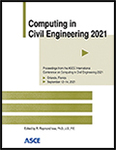Integrated Energy-Use Model to Identify Energy-Use Profile of Hotel Guests
Publication: Computing in Civil Engineering 2021
ABSTRACT
Hotel guests’ energy-related behavior is one of the main factors that affects energy consumption in hotel buildings. However, there are few studies that provide practical and efficient energy-use reduction strategies based on guests’ energy-related behavior in hotel buildings. To address this research gap, this study aims to develop an integrated energy-use model in four steps: (1) incorporating four energy-related behavior models (i.e., motivation-opportunity-ability, norm activation model, theory of planned behavior, and pro-environmental behavior); (2) developing a set of hypotheses and their relevant measures to examine the relationship among the energy-related behavior models and hotel guests’ energy-use behavior; (3) conducting an energy-use survey to analyze the effect of each determined measure on hotel guests’ energy-use behavior; and (4) analyzing the energy behavior data to identify energy-use profiles (i.e., prone, indifferent, or resistant to change) of hotel guests. The findings can provide decision-makers in hospitality management with a better understanding of their guests’ energy-related behavior and accordingly develop effective strategies to reduce energy consumption in hotel buildings.
Get full access to this article
View all available purchase options and get full access to this chapter.
REFERENCES
Ajzen, I. (1991). “The theory of planned behavior.” Organizational Behavior and Human Decision Processes, Theories of Cognitive Self-Regulation, 50(2), 179–211.
Chen, M.-F., and Tung, P.-J. (2014). “Developing an extended Theory of Planned Behavior model to predict consumers’ intention to visit green hotels.” International Journal of Hospitality Management, 36, 221–230.
D’Oca, S., Chen, C.-F., Hong, T., and Belafi, Z. (2017). “Synthesizing building physics with social psychology: An interdisciplinary framework for context and occupant behavior in office buildings.” Energy Research & Social Science, 34, 240–251.
Grob, A. (1995). “A structural model of environmental attitudes and behaviour.” Journal of Environmental Psychology, Green Psychology, 15(3), 209–220.
Hooper, D. (2012). Exploratory Factor Analysis. Books/Book Chapters.
Kaiser, F. G., and Fuhrer, U. (2003). “Ecological Behavior’s Dependency on Different Forms of Knowledge.” Applied Psychology, John Wiley & Sons, Ltd, 52(4), 598–613.
Karatas, A., Menassa, C. C., and Stoiko, A. (2015). “A Framework for Delivering Targeted Occupancy Interventions to Reduce Energy Usage in Buildings.” Procedia Engineering, Defining the future of sustainability and resilience in design, engineering and construction, 118, 752–759.
Karatas, A., Stoiko, A., and Menassa, C. C. (2016). “Framework for selecting occupancy-focused energy interventions in buildings.” Building Research & Information, 44(5–6), 535–551.
Kurisu, K. (2015). Pro-environmental Behaviors. Springer Japan.
Li, D., Menassa, C. C., and Karatas, A. (2017). “Energy use behaviors in buildings: Towards an integrated conceptual framework.” Energy research & social science, Elsevier, 23, 97–112.
Li, D., Xu, X., Chen, C., and Menassa, C. (2019). “Understanding energy-saving behaviors in the American workplace: A unified theory of motivation, opportunity, and ability.” Energy Research & Social Science, 51, 198–209.
Lutzenhiser, L. (1993). “Social and Behavioral Aspects of Energy use.” Annual Review of Energy and the Environment, Annual Reviews, 18(1), 247–289.
Miao, L., and Wei, W. (2013). “Consumers’ pro-environmental behavior and the underlying motivations: A comparison between household and hotel settings.” International Journal of Hospitality Management, 32, 102–112.
Rivis, A., and Sheeran, P. (2003). “Descriptive norms as an additional predictor in the theory of planned behaviour: A meta-analysis.” Current Psychology, 22(3), 218–233.
Schwartz, S. H. (1977). “Normative Influences on Altruism.” Advances in Experimental Social Psychology, Elsevier, 221–279.
Steg, L., and Vlek, C. (2009). “Encouraging pro-environmental behaviour: An integrative review and research agenda.” Journal of Environmental Psychology, Environmental Psychology on the Move, 29(3), 309–317.
Takala, M. (1991). “Environmental Awareness and Human Activity.” International Journal of Psychology, Routledge, 26(5), 585–597.
Thøgersen, J. (2014). “The Mediated Influences of Perceived Norms on Pro-environmental Behavior.” Revue d’economie politique, Dalloz, Vol. 124(2), 179–193.
Werff, E., and Steg, L. (2015). “One model to predict them all: Predicting energy behaviours with the norm activation model.” Energy Research & Social Science, 6, 8–14.
Zhang, Y., Wang, Z., and Zhou, G. (2013). “Antecedents of employee electricity saving behavior in organizations: An empirical study based on norm activation model.” Energy Policy, 62, 1120–1127.
Information & Authors
Information
Published In
History
Published online: May 24, 2022
Authors
Metrics & Citations
Metrics
Citations
Download citation
If you have the appropriate software installed, you can download article citation data to the citation manager of your choice. Simply select your manager software from the list below and click Download.
